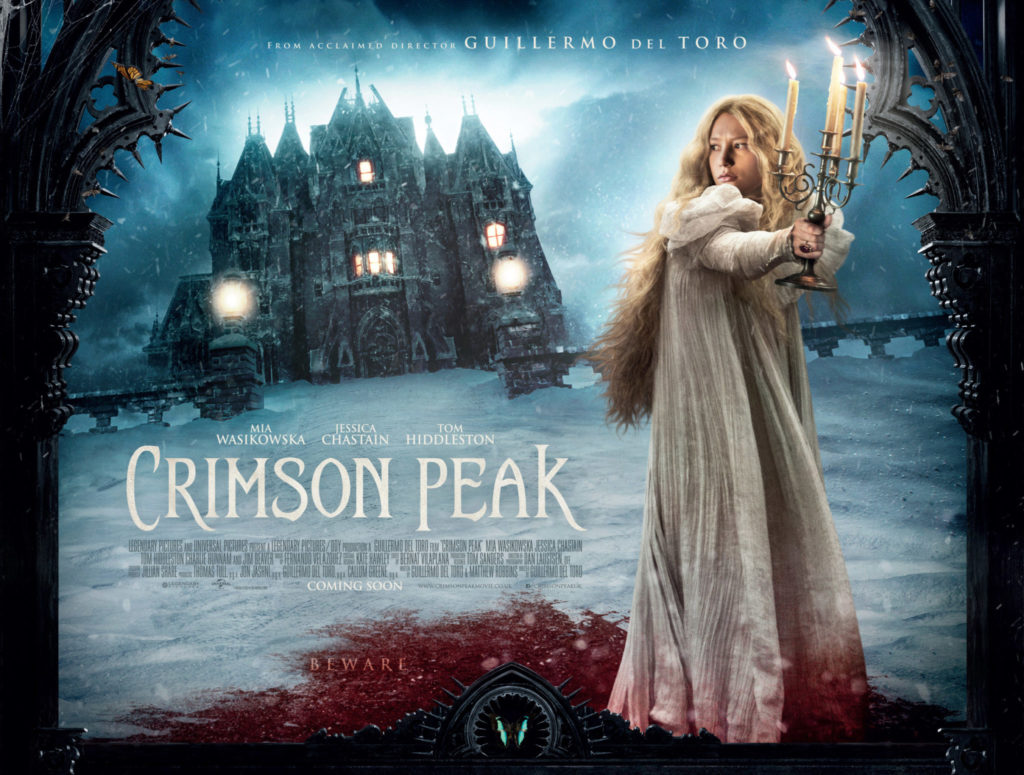
This year I resolved to see 12 new-to-me movies in an attempt at catching up with pop culture. It’s a pretty much hopeless task, I think, but one I’m enjoying. Finally, a good reason to sit down and say, no, really, I must watch a movie!
The rules have shifted a little as I’ve moved through the year. As they stand now, they are:
- It must be spec-fic. For review here on Spec-Chic and for myself. I just prefer it. Science Fiction, Fantasy, Horror. Even kid’s movies if they fit one of those genres!
- For the most part, the movie must be popular spec-fic. Something people around me have been talking about.
- I have to see at least a third of them in the theater, for the truest “in the moment” connection. Rule amended! Theater-seen movies are part of the Spec Chic Sound Off!s instead, which technically means I’m seeing more than a dozen movies in 2017.
Only a few more to go, and then I’ll be able to say with complete honesty that hey, I accomplished a new year’s resolution.
Upcoming movies are:
Fantastic Beasts & Where to Find Them (October’s movie posted in November)
Midnight Special (November’s movie posted in December)
And the final movie of the year: Pride & Prejudice & Zombies (a good movie for December when my brains always feel like they’re dribbling out of my ears anyway. My thoughts on it will be posted January 2018. Wow, so soon!)
But the movie I chose for September, and the one I’m talking about now, was Crimson Peak. We’re starting October, the time of all things horrific (and delightful!), so naturally the movie I chose for this month is a horror film. Theoretically, at any rate.
 Why I Chose it: Because horror stories are weirdly near and dear to my heart, even as I cower from them. Because the trailers looked beautiful. Because Tom Hiddleston is great at playing in-between sorts of characters. I don’t know. It just seemed appealing. And because lots of people, including our Editor-in-Chic, suggested it!
Why I Chose it: Because horror stories are weirdly near and dear to my heart, even as I cower from them. Because the trailers looked beautiful. Because Tom Hiddleston is great at playing in-between sorts of characters. I don’t know. It just seemed appealing. And because lots of people, including our Editor-in-Chic, suggested it!
Why I Didn’t See It in the Theaters: I rarely go see horror in the theaters, first off. I want more control over my intake than the theater allows. This makes me a bad movie-goer, I freely acknowledge that. I don’t care how the artist wants me to see the movie; if I feel like stopping it for a while and doing a household chore until the mood they’re building shatters… so be it. I have a morbid enough brain that I don’t really like to let certain types of horror in, unchecked. So horror movies are definitely a watch-at-home kind of thing.
Also, Crimson Peak is Guillermo del Toro, and that brings its own baggage for me. His movies are visually striking and powerful, and his themes… Well, he really harps on man’s inhumanity to man more than anything else it seems. There are monsters in his world, but they sometimes seem incidental to the true terrors of life — other people. I’d seen Cronos, which left me with pervasive melancholy for days. I watched The Devil’s Backbone, which gave me the shuddering heebie-jeebies about Spanish history, and the behavior that comes during war. Especially civil wars. I own Pan’s Labyrinth but it’s still in plastic because I can’t bring myself to watch it. It’s set in that same Spanish Civil War period and evokes a “sadistic army officer,” so… nope. Monsters are fine. People terrify me.
All of this meant that I as much as I wanted to see it, I was also reluctant to give it space inside my head.
But I’d promised to watch it.
And watch it, I did. Alone, on a stormy night, in a mostly dark house. With two bowls of popcorn — one for me and the cats, one for the dogs.
It seduced me in right away.

Me, staring at the screen: Why, you’re kind of wonderful, aren’t you?
What I Thought: One of the reasons I did finally put it on the DVD player was that I’d heard the movie had been badly marketed. That Crimson Peak wasn’t just a collection of violent ghost jump scares. That it was more of a gothic than a horror movie. That it was, in fact, just not that scary. So that was fine. But was it going to be good?
Yes. Oh yes. It surprised me, but I really loved this movie. For so many reasons.
SPOILERS BELOW
Of course, this movie was beautiful. The historical NY period was lovely to watch, but once Edith and Thomas arrived at the isolated Allerdale Hall, the pretty really kicked up a notch. It’s peculiar because it’s not like Allerdale Hall is the lap of luxury. Edith’s home in New York was far more livable than this decaying old house. But there’s something fairy-tale like about the way del Toro designed the house. It ended up feeling less like a decaying sinking house and more of a haunted wood. There are shafts of sunlight dancing through holes in the roof, and snow flakes whirling and sparkling, and black moths coating rooms like living wallpaper.
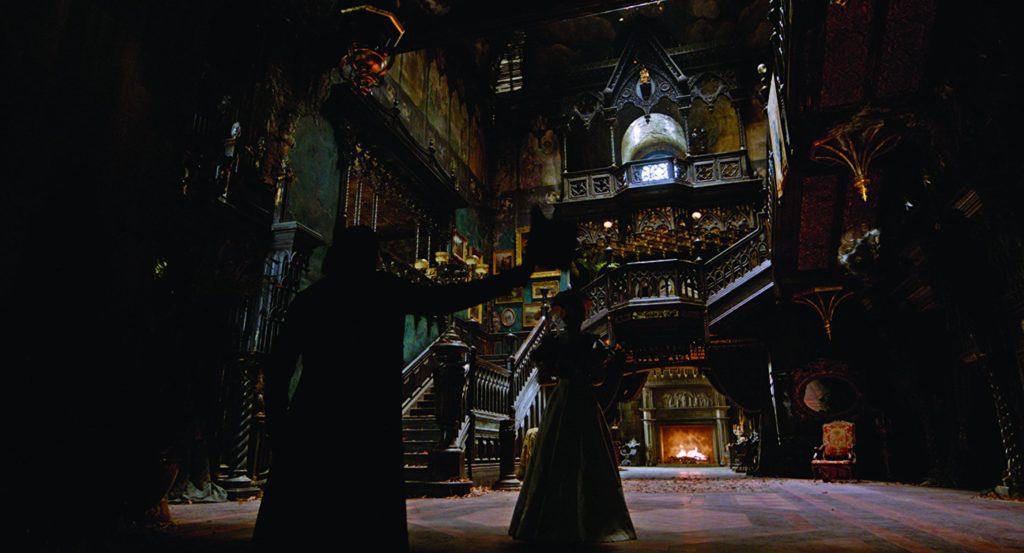
And Edith swans around in ridiculous nightgowns, so puffed at the sleeves I expect her to take flight. Lucille wears a nightgown during the pivotal points of the movie that could be made out of moths wings, all pearl and black and silver.
The music was wonderful. I accidentally set the DVD to play long before I could actually sit down to watch it and had to listen to the main menu cycle over and over again, and you know what? I didn’t mind it. I loved it. Fernando Velazquez did the music and did a great job.
But come on, those are pretty much incidentals to the meat of things for me. I care about the characters! I care about the plot! How were they?
Characters get an A++ from me. I loved Edith. She was written so well, managing to be both understandably naïve as well as intelligent, and Mia Wasikowska plays her equally well. She was inexperienced, not stupid, and the movie made that clear over and over and over again. Half the time, I assumed she married Thomas not just because she loved him, but because she thought he was right about her writing — that she was too inexperienced to write about lovers and romance and hey, here’s this attractive man…. Plus, she was sensible. I made a note: it took an hour and 19 minutes into the movie before Edith did something that made me cringe. That’s amazing.
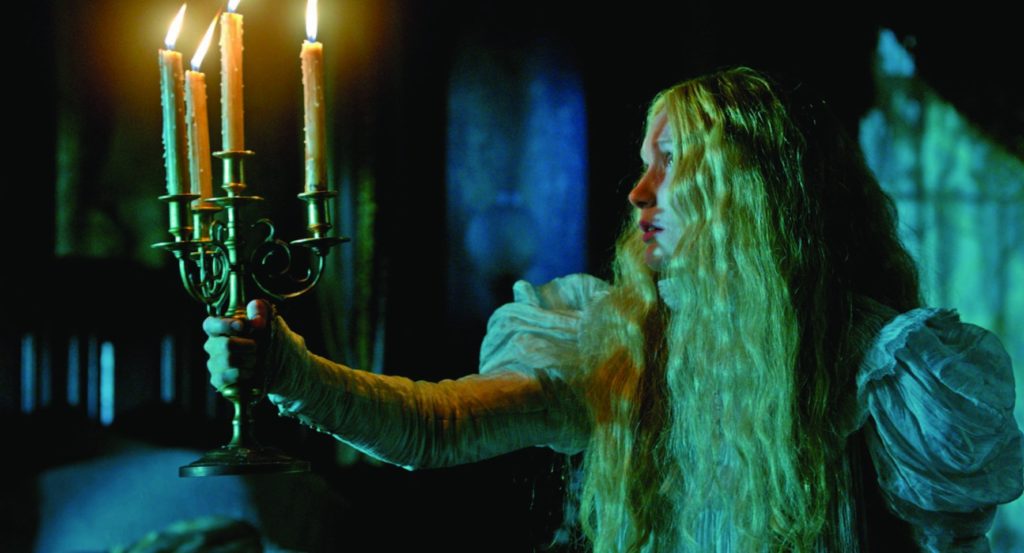
Lots of time to sleuth at night, because my husband’s so rarely in my bed!
When she begins to realize how imperiled she is, she doesn’t flail and panic, she investigates. Instead of just hysterically demanding answers from Thomas and Lucille (as so many gothic heroines might), she explores, she intuits, she finds clues and puts them together. Then she tries (and succeeds!) to change her husband’s perspective, asking him the simplest of questions: Why do you stay tied to a house you hate? Why not leave? Look forward instead of dwelling in the past? She might as well be conducting therapy, it’s such a wake-up call for him.

Passionate, a genius, kind of morally dumb.
Because Thomas is also an interesting character: intelligent but unthinking.
Unquestioning of his existence or the things they do to maintain it — even to the point of never asking if he actually wants to maintain what he has. He’s weak in some ways, and an agile liar. He could be an easy character to turn into a contemptible bad guy. But 1) del Toro writes him with sympathy and 2) Hiddleston is very practiced at making weakness and emotional idiocy appealing. He changes. He learns to ask questions. He learns to say no, Lucille, I think that’s a bad idea. He just does it all a little too late. But he does help Edith save herself.
Lucille is the weakest of the triad for me: intelligent but in a disordered, obsessive way.
Where Thomas knows he’s weak and trusts Lucille to make most of the decisions, Lucille’s decisions are oddly reactionary. Her back story is a weaker link. Her timeline was not always clear to me. Their father was a brute who broke their mother’s legs. Lucille had to care for her, killed her in the bath, and was sent away to an asylum. Yet, the implication is she killed her mother because the woman was a cruel martinet who kept too close a disapproving eye on her son, so that Lucille had to defend him. Also explained to Edith, Lucille killed her mother because their mother found out Lucille was seducing Thomas.
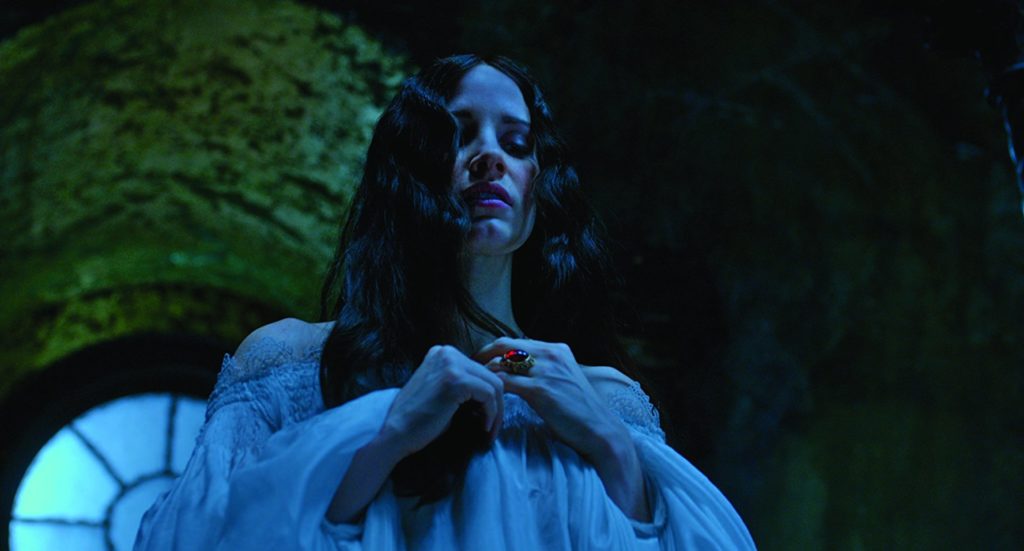
But Jessica Chastain’s Lucille makes a good villain. A weird sort of Bluebeard. I won’t give you the keys to certain rooms, and you mustn’t look inside, but I won’t wait for you to try — I’ll poison you instead. And your dear husband will pretend it’s not happening. She’s an unreliable narrator as a villain and that’s unusual. But she has oodles of charisma to gloss over all the gaps in her backstory.
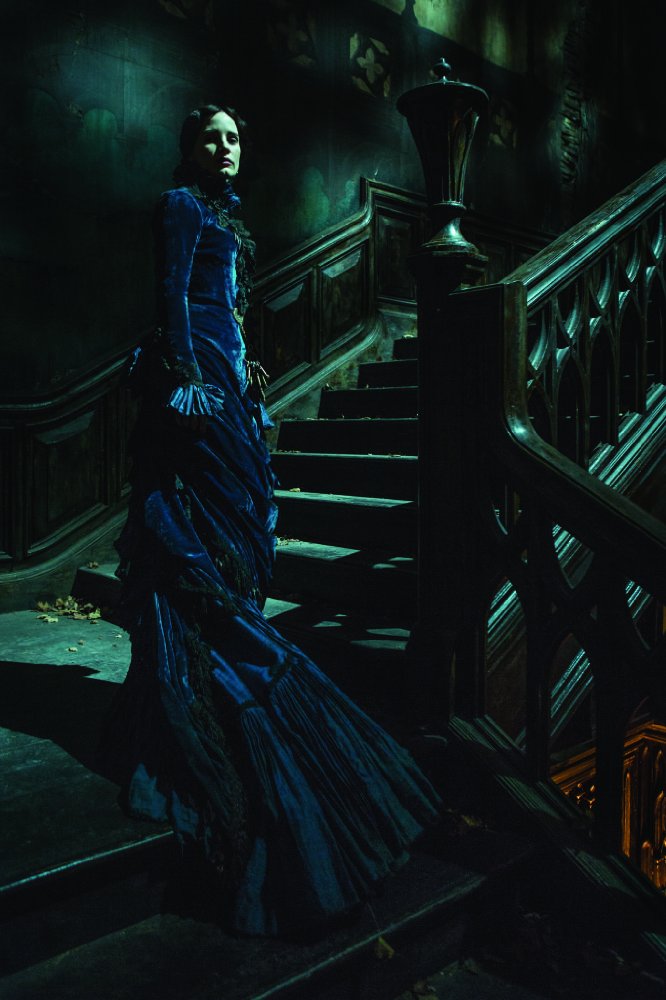
I’m not wicked, I just dress that way. Actually, no, I’m wicked.
One other character is really worth mentioning: Charlie Hunnam’s character — young doctor Alan McMichael who’s a lifelong friend of Edith’s. It would have been so easy to make him the obvious other love interest and he is… but in a very low-key sort of way. When she falls for Thomas, he’s not angry, more concerned and rethinking his own future. He’s quick to worry about her, and when he gets disturbing news about Thomas and Lucille, off he goes to the rescue. Sort of. They survive together, but there’s no flag-waving that now, she’ll marry the right man, the one she should have married instead. And del Toro never really leaves it in doubt that Edith does love crazy Thomas more than a little.
So characters are a win, setting is a win, music a win… is it a perfect movie?
Nope. Nothing’s ever perfect.
One of the reasons I shy away from del Toro is his very realistic violence. People don’t get hit on the head and die, leaving a good looking corpse. Edith’s father is murdered, his head bashed in and hey, oh yeah, that’s a gross, deformed head. His ghosts are mangled, barely recognizable as human. So there’s this weird glitch toward the end, where Edith has a terrible fall — three floors and crashing through a balcony to end on the floor below — and the realistic repercussions of violence vanish without a trace. Dr. Alan tells her that her leg is broken, and if that’s all, that’s a freaking miracle as it is, but then Edith’s zooming around fighting Lucille on her broken leg. It’s tonally really different from the rest of the movie. Like Edith suddenly turns into a superhero.
I can and did hand-wave it (oh the ghosts helped break her fall, and oh she landed on a section where there was a lot of snow, and oh the floor’s sinking and the clay probably absorbed some of the impact, and oh, maybe the doctor was lying because he understood how sinister the surroundings were and wanted an excuse to take her out of there, and oh, maybe her nightgown’s just that puffy) but it involved a lot of thinking and took me out of the movie’s spell at a pivotal point.
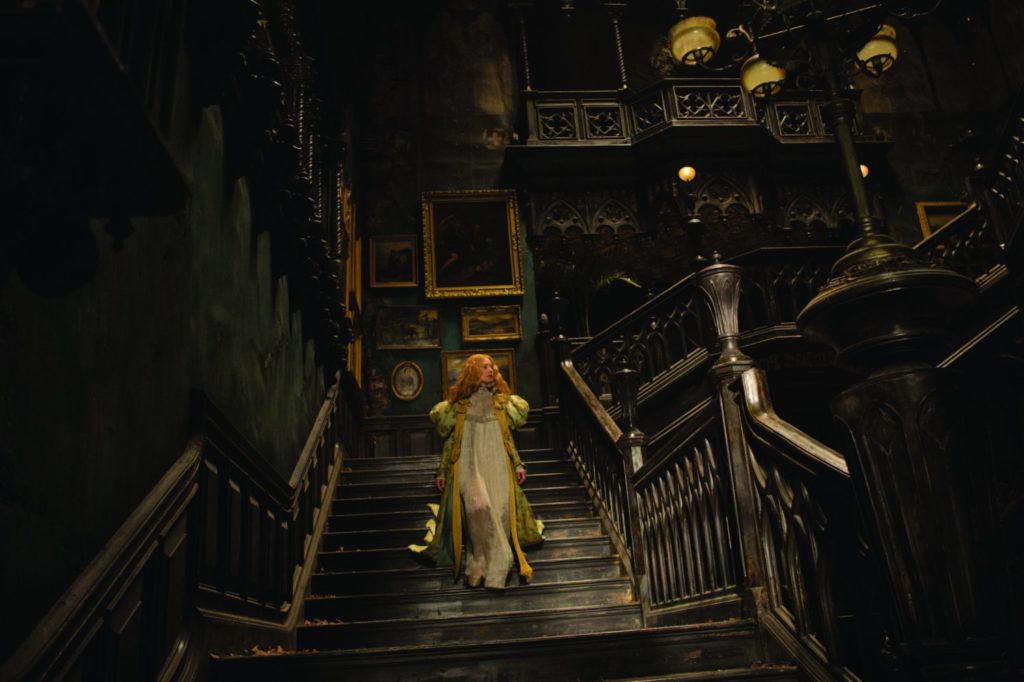
Tell me those sleeves couldn’t pad a multiple floor fall… go on, tell me.
There’s some irritating opacity about the ghosts themselves. They’re color coded! Black ghosts, red ghosts, a white ghost at the end. And I was never clear what those colors meant despite Edith happily telling me. Black ghosts stick around for love, for hate, for something undone. Red ghosts are murdered victims. But the white ghost… Couldn’t quite figure that one out. A ghost that accomplished what it wanted to do? I need more than one data point, del Toro! You don’t need to serve it to me on a platter, but more than one data point! But they are del Toro’s ghosts — horrifying even when their intentions are benign, and oddly fluid, as if they’re trapped underwater. This is the same type of ghost he used in The Devil’s Backbone, so maybe my extra data points are in his other movies.
I loved that Thomas’ third wife was Italian and the letters sent to her were in Italian, which Edith couldn’t read. I loved that tangle of complexity — here’s something that might give her some desperately needed answers, and…whoops, should have studied Italian instead of French. I loved that the dead wives had a visceral presence, both terrifying and warning at once. But I found the Victrola evidence really contrived. One wife recording her last words, sure. But three, in a row, and only the third one hid the record player? It felt forced.
But these — superhero Edith, opaque ghost codes, and a too convenient recording device — really don’t detract from this movie’s strengths. I can see rewatching this more than once. There’s a lot going on in that will make going back to it rewarding.

I see you. You’re a bloody ghost. Still not a horror movie.
Was it or was it not a horror movie? I’d go with no. It’s a gothic. With ghosts. A dark romance. A coming of age story with murder and poison and family secrets. It’s a lot of fun.
All photos from imdb.com.

When I think about this movie, I have a feeling of, “I liked this, but….” and I think the “but” comes from the special effects that just did not work for me, and I think I wanted it to be scarier than it was? Yet I liked it well enough that I recommended it to you, and I think it’s because of what the movie does well. I liked that Hiddleton’s character was genuinely in love with our heroine, and never went full evil villain, and Chastain’s character was interesting to me, though like you said, inconsistent.